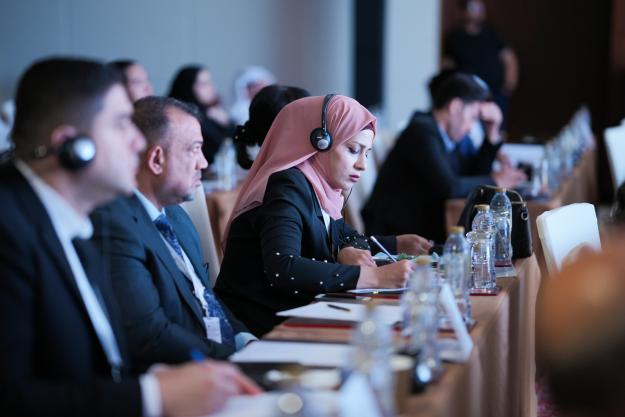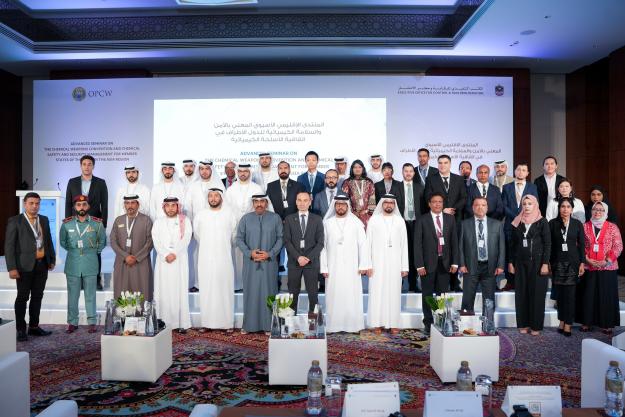Experts and professionals from Asia shared information and exchanged experiences, policies, and practices in chemical safety and security management during a seminar organised by the Organisation for the Prohibition of Chemical Weapons (OPCW) with the support of the United Arab Emirates Executive Office for Control and Non-proliferation (EOCN).
The seminar, held in Dubai, United Arab Emirates, from 7 to 9 February 2023, is part of an OPCW series of integrated chemical management programmes on chemical safety and security for industry.
The objective of the seminar was to raise awareness of the importance of chemical safety and security policies and provide tools for preventing incidents involving toxic chemicals.
In his opening remarks, H.E. Talal Al Teneiji, Director of EOCN, thanked the OPCW for its valuable support in promoting peaceful uses of chemistry.
H.E. Jamal Al Musharakh, Ambassador of the United Arab Emirates to The Kingdom of the Netherlands and Permanent Representative of the United Arab Emirates to the OPCW, highlighted the importance of promoting a chemical safety and security culture to prevent chemical incidents and accidents

The seminar was an opportunity for participants from governmental and private chemical laboratories, the chemical industry, academia and national authorities to share information and exchange experiences, policies, and practices in chemical safety and security, generate recommendations for the review of the existing policies and practices and promote a wider regional and international cooperation in the field of chemical safety and security management.
Participants were briefed on a variety of safety and security management topics, including industry outreach, dual-use chemicals and risk assessments for accident prevention. One session was dedicated to the role of customs in preventing the diversion of chemicals for not permitted uses.
The seminar was attended by 33 participants representing 13 OPCW Member States: Bangladesh, China, India, Indonesia, Iran, Islamic Republic of Iraq, Jordan, Malaysia, Myanmar, Pakistan, Philippines, Sri Lanka and United Arab Emirates

Background
The OPCW Chemical Safety and Security Programme was launched in 2009 and has since become a leading forum for the exchange and development of expertise in chemical management.
As the implementing body for the Chemical Weapons Convention, the OPCW, with its 193 Member States, oversees the global endeavour to permanently eliminate chemical weapons. Since the Convention's entry into force in 1997, it is the most successful disarmament treaty eliminating an entire class of weapons of mass destruction.
As the implementing body for the Chemical Weapons Convention, the OPCW, with its 193 Member States, oversees the global endeavour to permanently eliminate chemical weapons. Since the Convention's entry into force in 1997, it is the most successful disarmament treaty eliminating an entire class of weapons of mass destruction.
Over 99% of all declared chemical weapon stockpiles have been destroyed under OPCW verification. For its extensive efforts in eliminating chemical weapons, the OPCW received the 2013 Nobel Peace Prize.






